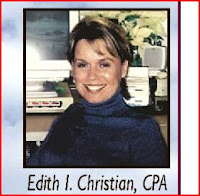When it comes to bookkeeping, it is important to start out correctly. Here is some advice from Score.org regarding tips on bookkeeping. When in doubt feel free to contact us at Edith I Christian CPA. We can handle it for you. Serving Milwaukee and Waukesha for all your accounting needs.
1.
Use the right accounting system. Most businesses
use either cash-based or accrual-based accounting. If you use the cash
method, you count income when you receive it and expenses when you pay
them. Under the accrual method, you count income and expenses when they
happen, not when you actually receive or pay them.
In practical terms, this difference in timing is relevant if your
company keeps inventory on hand or handles transactions on credit. In
these cases, the accrual method might be a better choice for your
business. And in fact, if your firm has more than $5 million in sales or
keeps an inventory, the IRS might require that you use the accrual
system. In other cases, however, the simpler cash system could be all
you need.
2.
Maintain daily records. This is one of the most
basic rules: If you don't keep accurate daily records, you don't have an
accurate way to track the financial condition of your business.
Different people use different record-keeping systems; what matters is
that you have one and use it every day. Once you have a good system set
up, accurate record keeping will take just a few minutes a day.
3.
Handle and review checks carefully. It's easy to be
on autopilot when you're writing checks and tossing canceled ones into a
filing cabinet without reviewing them. Remember: Those checks are as
good as cash. And if something goes wrong, you — not the bank — will be
on the hook. Take the same care with checks as you would with cash. Sign
checks using a clear, distinctive signature that won't invite forgery.
Review canceled checks before anyone else, including your bookkeeper or
employees, sees them; that way you can catch unauthorized checks. And if
your business is a partnership, it's a good idea to have at least one
of the partners co-sign the checks.
4.
Get a bank statement with a month-end cutoff. This
is another basic tip that can reap big rewards. Synchronizing your bank
statement with other monthly records will make it much easier to
reconcile your statement and track expenses.
5.
Leave an audit trail. Your record keeping will be
much more effective if you have a system that allows you to quickly and
easily retrace your company's financial activities. This means keeping
your invoices and checks in numeric order, not skipping check or invoice
numbers, and keeping separate bank accounts for your business and
personal funds. If you can't go back a year and reconstruct your
company's finances, you probably aren't leaving an effective audit
trail.
6.
Use a computer. Computer bookkeeping software is
absolutely essential for all but the smallest businesses. These
applications make it easy to track income and expenses, prepare tax
documents, summarize your company's financial activities and back up
records for safekeeping. If you're working with an outside bookkeeper,
make sure they know how to use a computer.


